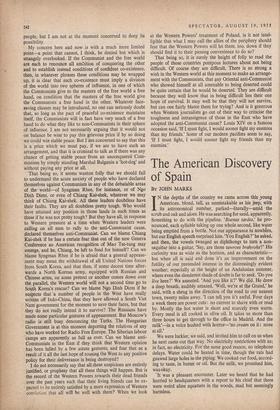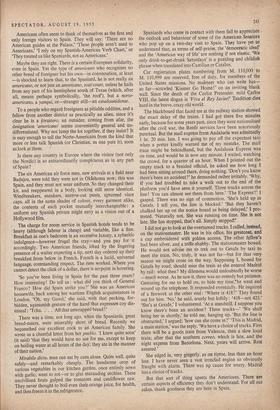The American Discovery of Spain
BY JOHN MARKS /N the depths of the country we came across this.young American, blond, tall, as unmistakable as his jeep, with its astronomical number, parked—literally—amid the scrub and oak and aloes. He was searching for sand, apparently. Something to do with the pipeline. 'Buenas tardes,' he pro- nounced, each syllable taking up one whole second, like water being emptied from a bottle. Not our appearance in nowhere, but our English speech surprised him. 'You English?' he asked. and then, the vowels twanged as diphthongs to turn a non- sequitur into a guitar, 'Say, are those tawroes brahvohs?' His curiosity was as wide as the horizon, and as characteristic— but when all is said and done it's an improvement on the futility of our pretended interest in the distressingly evident weather; especially at the height of an Andalusian summer, where even the slenderest shade of doubt is far to seek. 'Do you live here?' We assented. 'And you like it?' We did. He drew a deep breath, audibly amazed. 'Well, we're at the Grand,' he said, with a shrug in the direction of the road to our nearest town, twenty miles away. 'I can tell you it's awful. Four days a week there are power cuts : no current to shave with or read by. Mostly the hot water is short and scarcely even warm. Every meal is all cooked in olive oil. It takes us more than three hours to get through to the office in Madrid. And the milk'—in a voice hushed with horror—'no cream on it : none at all.
We were luckier, we said, and invited him to call on us when he next came out that way. No electricity restrictions with us; in fact, no electricity. For the same good reason, no telephone delays. Water could be heated in time, though the rats had gnawed large holes in the piping: We cooked our food, accord- ing to taste, in butter or oil. But the milk, we promised him, was okay. , It was a pleasant encounter. Later we heard that he had hurried to headquarters with a report to his chief that there were weird alien squatters in the woods, mad but seemingly harmless. Americans often seem to think of themselves as the first and only foreign visitors to Spain. They will say: 'There are no American guides at the Palace,' These people aren't used to Americans; `I rely on my Spanish-American Verb Chart,' or `They treated us like Spaniards, not as Americans.'
Maybe they are right. There is a certain European solidarity, even in Spain. Yet the type of americano who recognises no other breed of foreigner but his own—in conversation, at least —is shocked to learn that, to the Spaniard, he is not really an americano, or not just an americano, tout court, unless he hails from any part of his hemisphere south of Texas (which, after all, means perhaps symbolically, 'the roof'), but a norte- americana a yanqui, or—stranger still—an estadounidense.
To a people who regard foreigners as pitiable oddities, and a fellow from another district as practically an alien, since it's clear he is a forastero, an outsider, coming from afar, the designation 'americano' seems conveniently general and un- differentiated. Why not lump the lot together, if they insist? It is easy enough to tell the Norte-Americans from the kind that more or less talk Spanish (or Christian, as one puts it), soon as look at them.
Is there any country in Europe where the visitor (not only the Nordic) is so extraordinarily conspicuous as in any part of Spain?
The six American air force men, new arrivals at a field near Badajoz, were told they were not in Oklahoma now: this was Spain, and they must not wear uniform. So they changed their kit, and reappeared in a body, looking still more identical. Windbreakers, sneakers, narrow-cut pants, upturned visor caps, all in the same shades of colour, every garment alike, the contents of each pocket mutually interchangeable : a uniform any Spanish private might envy as a vision out of a Hollywood film.
The charge for room service in Spanish hotels tends to be heavy (although labour is cheap) and variable, like a fine. Breakfast in one's bedroom is an excessive luxury, a sybaritic indulgence—however frugal the tray—and you pay for it accordingly. Two American friends, irked by the lingering presence of a waiter expecting a tip, next day ordered up their breakfast from below in French. French is a lucid, universal language, commanding respect. The ruse worked. Where you cannot detect the clink of a dollar, there is no.point in hovering.
`So you've been living in Spain for the past three years? How interesting! Do tell us : what did you think of General Franco? How did Spain strike you'?' She was an American housewife, back among her wartime English acquaintances in London. 'Oh, my Gawd,' she said, with that pecking, for- bidden, squeamish gesture of the hand that expresses coy dis- missal : 'Tcha. . . . All that unwrapped bread ! '
There was a time, not long ago, when the Spaniards, great bread-eaters, were miserably short of bread. Recently we bequeathed our excellent cook to an American. family. She wrote us a cheerful letter from her pueblo. 'I knew quite soon' (it said) 'that they would have no use for me, except to keep on boiling water at all hours of the day; they ate in the manner of their nation.'
Mirabile dictu, man can eat by cans alone. Quite well, quite safely—and remarkably cheaply. The handsome crop of various vegetables in our kitchen garden, once entirely sown with garlic, went to rot—or to glut marauding urchins. These uncivilised brats gulped the tomatoes and cauliflower raw. They never thought to boil even their orange juice, for health, and then freeze it in the refrigerator. Spaniards who come in contact with them fail to appreciate the outlook and behaviour of some of the American Senators who pop up on a two-day visit to Spain. They have yet to understand that, as terms of self-praise, the 'democratic ideal' and the 'American way of life' are nothing if not elastic. 'We only drink-to-get-drunk Saturdays' is a puziling and childish phrase when translated into Castilian or Catalan.
Car registration plates numbering from M. 110,000 to M. 110,999 are reserved, free of duty, for members of the United States missions. No muleteer who can write bas- so far—scrawled `Kissner Go Home!' on an inviting blank wall. Since the death of the Carlist Pretender, mild Carlos VIII, the latest slogan is 'Viva el Rey Javier!' Tradition dies hard in the brave, crazy old world.
The blackboard that faced me at the railway station showed the exact delay of the trains. I had got there five minutes early, because for some years past, since they were nationalised after the civil war, the Renfe services have been notoriously punctual. But the mail express from Andalucia was admittedly 1 hr. 20 min. late. I was going to pay off the expectant taxi when a porter kindly warned me of my mistake. The mail train might be behindhand, but the Andalusia Express was on time, and would be in now any minute. I waited, watching the crowd, for a quarter of an hour. When I pointed out the empty track to a braided official, he asked me how long I had been sitting around there, doing nothing. 'Don't you know there's been an accident?' he demanded rather irritably. 'Why, if you had troubled to take a walk out to the end of the platform you'd have seen it yourself. Three trucks across the line ! You can almost see them from here.' The Express?' I gasped. There was no sign of commotion. 'She's held up at Getafe. I tell you, the line is blocked.' But they haven't chalked her up on the notice board as being delayed,' I pro- tested. 'Naturally not. She was running on time. She is not late. She has stopped, that's all. Simply stopped?
I did not go to look at the overturned trucks. I called, instead, on the stationmaster. He was in his office, his greatcoat, and a cap embroidered with golden acorns. The other fellow's had been silver, and a trifle shabby. The stationmaster bowed. He would not advise me to trek out to Getafe by taxi to meet the train. No, truly, it was not far—but for that very reason we might cross on the way. Supposing I, bound for Getafe by road, should miss the train as she entered Madrid by rail : what then? My dilemma would undoubtedly be worse —much worse. As lie saw it, there was no remedy but patience. Gesturing for me to hold on, to bide my time,' he went and wound up the telephone. It responded eventually. He inquired of a firework at the other end : 'Where is 418?' They found out for him. `No,' he said, sourly but loftily : '418—not 423.'
`She's at Getafe,' I volunteered. 'At a standstill. I suppose you know there's been an accident? Three trucks—"We shall bring her in shortly,' he told me, hanging up. 'But the line is obstructed,' I argued; 'how can she come in ?"This is Madrid, a main station,' was the reply. 'We have a choice of tracks. First there will be a goods train from Valencia, then a slow local train; after that the southern correo, which is late, and the night express from Barcelona. Next, yours will arrive. Rest assured.'
She edged in, very gingerly, as on tiptoe, less than an hour late. I have never seen a vast ironclad engine so obviously fraught with alarm. There was n9 cause for worry. Madrid has a choice of tracks.
But that sort of thing upsets the Americans. There are certain aspects of efficiency they don't understand. For all our sakes, thank goodness they are here in Spain.



































 Previous page
Previous page